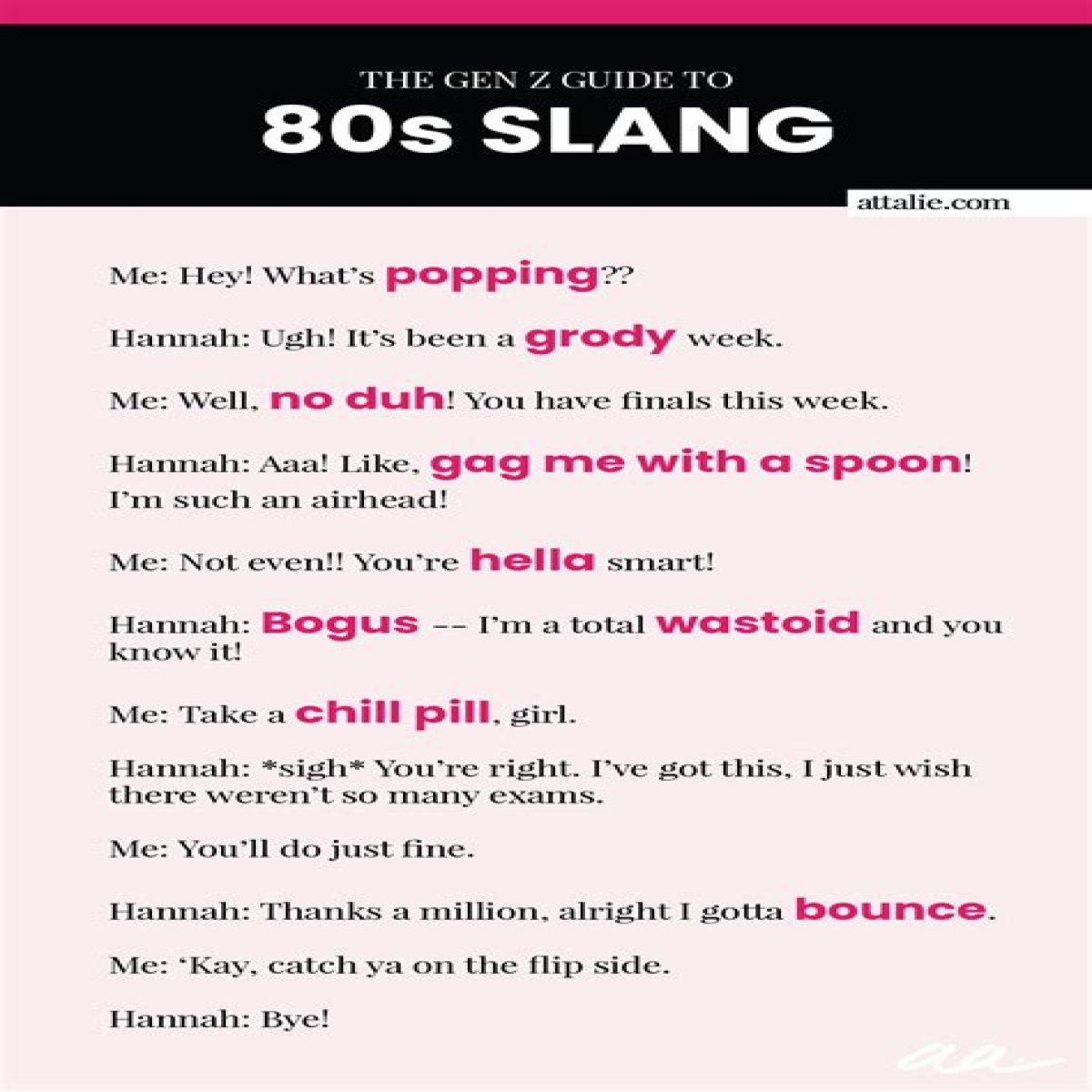The 1980s was a vibrant decade that saw cultural shifts, fashion revolutions, and a lexicon that was as colorful as the neon lights of the era. The UK was at the forefront of this linguistic evolution, creating a unique slang that was a fusion of regional dialects, youth culture, and a dash of rebellious spirit. It was a time when language became a way for the youth to express their identity, often leaving older generations scratching their heads in confusion. For anyone curious about what it meant to be part of the '80s in the UK, understanding 80s UK slang is essential.
From the music scene that gave rise to new wave and punk rock to the television shows that captured the imagination of a generation, the slang of the 80s UK reflected the times. It was a language that spoke of freedom, adventure, and sometimes, sheer absurdity. Phrases like “totally rad” and “wicked” were not just words; they were a way of life. This article will explore some of the most iconic terms that emerged during this decade, offering insights into their meanings and how they were used in everyday conversation.
As we delve into the world of 80s UK slang, we’ll uncover the stories behind these words and phrases, how they influenced modern language, and their lasting impact on British culture. So, whether you're a nostalgic soul longing for the past or a curious learner, join us as we embark on this linguistic journey through the vibrant streets of 80s Britain.
What Was the Origin of 80s UK Slang?
To truly appreciate 80s UK slang, it’s crucial to understand where it originated. The slang of this time was influenced by various factors, including:
- Music: Genres like punk, ska, and new wave introduced a plethora of terms.
- Television: Popular shows like "The Young Ones" and "Only Fools and Horses" showcased the language of the streets.
- Regional Dialects: Varied dialects across the UK contributed to a rich tapestry of slang.
- Youth Culture: A sense of rebellion and individuality drove the creation of new terms.
Which Terms Were Most Popular in the 80s?
Some slang terms have stood the test of time, while others have faded into obscurity. Here are a few popular phrases from the era:
- “Bodacious”: Meaning impressive or excellent.
- “Minted”: Referring to someone who is wealthy.
- “Phat”: Used to describe something that is excellent or attractive.
- “Wicked”: A term used to express approval, often used to describe something cool.
- “Chill”: To relax or take it easy.
How Did 80s UK Slang Influence Modern Language?
Many terms from the 80s have seamlessly integrated into contemporary vernacular. The influence of 80s UK slang can be seen in:
- Social Media: Phrases like “lit” and “savage” echo the playful spirit of 80s slang.
- Music: Modern artists often reference or incorporate retro slang into their lyrics.
- Fashion: The vibrant language of the 80s continues to inspire modern fashion trends.
Who Were the Key Figures of 80s UK Slang?
While slang originated from the streets, certain celebrities and public figures helped popularize it. Here’s a look at some influential personalities:
| Name | Profession | Contribution |
|---|---|---|
| David Bowie | Musician | Fused various musical styles, influencing youth culture. |
| Margaret Thatcher | Politician | Her policies sparked new slang terms among the youth. |
| Boy George | Musician | Popularized fashion and language associated with the LGBTQ+ community. |
| John Cleese | Comedian/Actor | Influenced slang through iconic British comedy. |
Are There Regional Variations of 80s UK Slang?
Indeed, 80s UK slang was not monolithic; it varied widely across different regions. Some examples include:
- London: Terms like “geezer” (a man) and “bird” (a woman) were commonly used.
- Liverpool: “Boss” was a term for something great or excellent.
- Manchester: “Sound” was used to describe something cool or good.
What Are Some Iconic 80s Slang Phrases and Their Meanings?
Here are a few standout phrases that encapsulate the spirit of the era:
- “Gagging for it”: Desperate or eager for something.
- “Barmy”: Crazy or silly.
- “Taking the mickey”: Making fun of someone.
- “All mouth and no trousers”: Someone who talks a lot but doesn’t follow through.
How Can You Use 80s UK Slang Today?
While some terms may feel outdated, using 80s UK slang can be a fun way to connect with history and culture. Here are a few tips:
- In Conversations: Sprinkle a few terms into casual chats to evoke nostalgia.
- In Writing: Use slang to add character to fictional narratives or poetry.
- Social Media: Share slang in captions or posts for a retro vibe.
What Is the Legacy of 80s UK Slang?
The legacy of 80s UK slang can be felt in today’s language, as it paved the way for a more dynamic and expressive form of communication. It represented a shift in societal norms and a desire for individuality, a spirit that continues to inspire new generations. Understanding and embracing this slang not only connects us to the past but also enriches our present interactions.
In conclusion, 80s UK slang is more than just a collection of quirky phrases; it is a reflection of a vibrant cultural moment that defined a generation. Whether you’re reminiscing about the past or exploring new ways to express yourself, these terms offer a unique glimpse into the rich tapestry of British history.
Susan Dey At 70: A Journey Through TimeUnraveling The Culture Of Black Rappers With DreadsExploring The Fascinating World Of Asmongold Tattoo
This is your guide to learning 80s slang Daniel Swanick
All The 80's Slang Words and Phrases That Defined an Era
The Ultimate '80s Page
